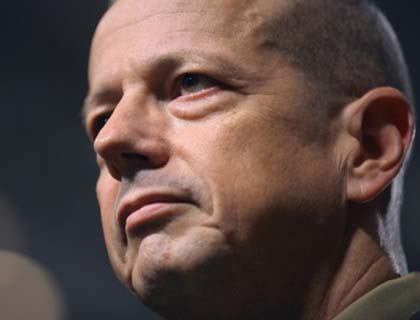KABUL - The post-2014 US presence in Afghanistan would be limited to intelligence gathering, special operations capabilities and training of the Afghan forces, the top US commander in Afghanistan said.
In an exclusive interview with Tolo news, Gen. John Allen, the commander of NATO-led International Security Assistance Force (ISAF) said the US footprint in Afghanistan beyond 2014 still needs to be determined.
"That is probably what you would see in 2015: advisors, trainers, some people to enable Afghan operations, some intelligence building capabilities and some special operators," said Gen. Allen.
The Afghan government will convene a more than 2,000-member jirga to debate the US-Afghan strategic partnership - an agreement Gen.Allen said is still to be finalised.
The strategic partnership with Afghanistan is a "big deal" for the United States, said Gen. Allen, adding the partnership would be "the logical extensions of that feeling that we have for Afghanistan".
"There will be a government-government relationship. I think it will create the opportunity for excellent economic relationships as well. There will probably be a security relationship that will emerge from the strategic partnership."
"If we agree to stay, it would be almost certainly a presence designed here to help to continue the growth of your military, the professionalisation of your military and that is coming extraordinary will actually and conceivably help Afghanistan to fight terrorism," the top US soldier in Afghanistan added.
The strategic partnership, according to Allen, would be a "binding agreement", however, it's up to the Afghan government to decide whether to make such an agreement.
He hoped the delegates attending the Loya Jirga understand the logic of the partnership.
There has been reports that Kabul and Washington still disagree on the nature of US unilateral operations and US-run prisons after the agreement is signed.
"We would be on a shared base, we would share a base with Afghan forces, so we would not create our own bases here and very likely the forces would be oriented on training and advising your forces, intending to increase the professionalism of your forces, he replied to a question on how the US military footprint would look like beyond 2014.
The Loya Jirga will also discuss the future of peace and reconciliation with the Taliban, a group according to Allen, some of whose segments are reconcilable.
In a question on whether Haqqani network can be negotiated and reconciled, he replied: "I don't know about the Haqqani network frankly. It's hard to say."
Nato forces have recently launched a major offensive against Haqqani network in eastern Afghanistan.
Former US Chairman of the Joint Chiefs of Staff, Adm Mullen, had said that Haqqani was the "veritable arm" of the Pakistani intelligence agency.
Gen. Allen agreed that Haqqani is largely based in Pakistan and he showed optimism that the Pakistani military will take action against the network, arguing he is not authorised to operate in Pakistan.
"We don't go across the border and we would not go across the border. We leave that to Pakistani military. But the Pakistani military I believe as the arm of the Pakistani government recognise that eventually they have to take action or these terrorists will turn on Pakistan as well," Allen concluded. (Tolo News)

